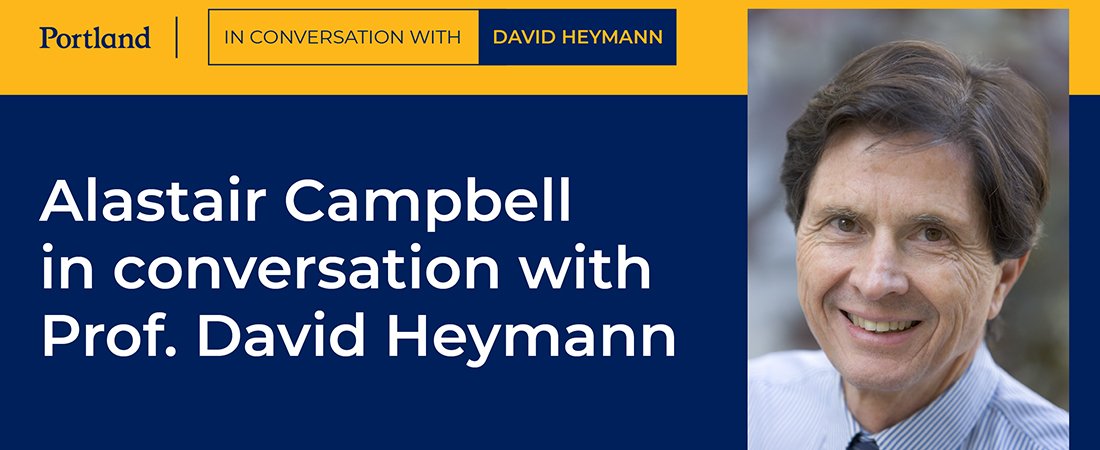Beating COVID-19 relies on us rapidly sharing scientific guidance, which is exactly where the World Health Organization’s (WHO) strength lies. That was a key takeaway from Professor David Heymann during the recent Portland webinar led by Alastair Campbell.
A global expert in epidemiology now based at the London School of Hygiene and Tropical medicine, Professor Heymann is also chairing the external advisory group to the programme that is running the emergency response under Dr Mike Ryan at the World Health Organization providing counsel on COVID-19 to governments across the world – leveraging his 22 years of experience at the WHO in global and field roles and a further 8 years chairing Public Health England, including leading the global response to SARS.
Founded after the Second World War, the World Health Organization (WHO) is a specialised agency of the United Nations, which aims to act as a coordinating body to health threats, providing guidance, making recommendations and enabling the sharing of information between countries. Despite having no direct authority over member countries, it is considered the international leader for public health.
In recent weeks, the WHO has found itself under fire, with US President Donald Trump claiming that the “WHO really blew it” over failing to challenge China’s early claims regarding human-to-human transmission of the novel coronavirus. In an unprecedented step, Donald Trump has now revoked US funding for the WHO – taking away the body’s biggest funding source.
Trump and the USA are not alone in their criticism of the WHO, but is this really justified?
Is the WHO failing?
Since the beginning of the COVID-19 outbreak, the WHO has been thrown into a high-profile role, acting as a perfect scapegoat for any mishandling of the crisis.
Current criticisms are partly spurred by undeniable failures during the SARS outbreak in 2002, which delayed efforts to control the spread of the disease, but is it really fair to criticise the WHO for their failure to get involved in long-standing political tensions between the US and China?
Behind the scenes of the public stage of global politics, the scientists and public health experts at the WHO are doing exactly what we need them to do. Professor Heymann explained how the organisation is actively facilitating exchange between countries who may otherwise appear hostile to global exchange, such as Iran and China, ensuring that the world is working as closely together on responding to this pandemic as possible.
Every week, key figures leading the public health response in each country are convened to discuss the latest evidence, including the UK’s Chief Medical Officer Professor Chris Whitty and Anthony Fauci, Director of the National Institute of Allergy and Infectious Diseases in the USA – this has a direct impact on how countries across the world are shaping and tailoring their response to the outbreak, ensuring they have access to the most up-to-date scientific information to keep their populations safe.
As a technical advisor on public health, its primary role, the World Health Organization is very much succeeding.
Beating COVID relies on us putting science before politics
Despite its leadership and scientific expertise, the WHO lacks “meaningful enforcement authority” and cannot apply blanket rules across nations. If the WHO does have failings, it is managing the complex geopolitical relationships that comes with managing a global pandemic response, but funding cuts cripple it where it is most effective – technical guidance and leadership across a broad range of health priorities not just COVID.
Ultimately, it is up to governments to review the technical guidance provided by the WHO and make their own decisions about which strategies to implement, while being mindful of their own national priorities.
All countries who are actively engaging with the WHO have access to the same information and guidance, but responses have been varied, as governments balance what they deem best for their own populations and what they can realistically implement.
Undoubtedly though, the most successful responses to COVID rely on measures and communications rooted in science. Where decisions have been made for political or economic reasons, it must be openly acknowledged.
Without this transparency, governments risk a never-ending stream of criticism and challenges.
If you can, please support the London School of Hygiene and Tropical Medicine COVID response fund, which aims to raise funds to support their work on COVID-19, including their new COVID-19 ‘Massive Open Online Course’, the work of our mathematical modellers, and the work of the UK Public Health Rapid Support team (which works to increase epidemic preparedness and outbreak response in low resource settings).

